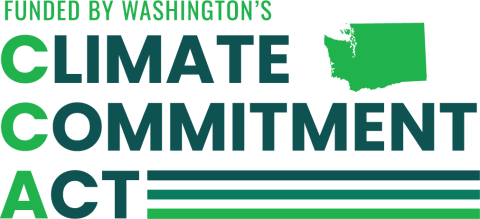Putting people to work in the new Washington Climate Corps
Young people feel anxious about climate change. But according to Gov. Jay Inslee, "the best antidote for anxiety is action."
On Friday, the governor visited Tacoma to celebrate the launch of the Washington Climate Corps. The program will support climate-related service opportunities for youth and veterans statewide. Members will conserve water in Gold Bar, conduct health education in Yakima, blaze trails in Kent, and more. The state's Climate Commitment Act was a key funding source to support these projects.
Service opportunities are posted to the Serve Washington and MyAmericorps websites.
Turning methane pollution into sources of fuel
Methane is a potent gas that retains heat in the atmosphere and contributes to climate change. Landfills and wastewater emit methane, and the governor toured the City of Tacoma's landfill and sewage treatment plants to see how they’re transforming methane from something that causes climate change to something that fights it.
At the waste treatment plant, sewage comes in and three products come out: clean water, award-winning TAGRO fertilizer, and clean transportation fuel. The methane that Tacoma collects from sewage is piped to a local utility and converted to compressed gas used by some of the city's garbage trucks. The city also captures methane from its landfill to prevent it from polluting the air.
Washington state recently adopted a new rule that requires landfills to capture harmful methane. Funds from the state's Climate Commitment Act will help landfill operators purchase necessary infrastructure.
Helping ports transition from dirty diesel to clean energy
Ports are major economic drivers for Washington state, but the ships, trucks and equipment are also big sources of diesel pollution. The governor visited the Port of Tacoma on Friday to see how new clean-tech infrastructure is making the air cleaner for neighboring communities and helping them move towards their goal of net zero emissions by 2040. Shore power at the Husky Terminal will help ships operate without burning diesel. Zero-emissions drayage trucks are zooming around the yard carrying freight.
Funding from the Climate Commitment Act funding will help more ports install shore power and switch to cleaner trucks and equipment. Washington is a leading state on climate and clean energy, and these kinds of projects provide an example to ports worldwide of how to reduce pollution.

